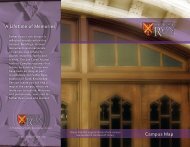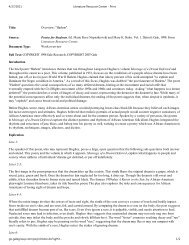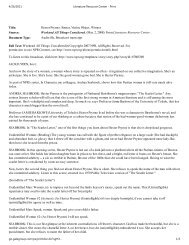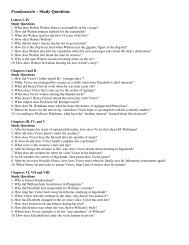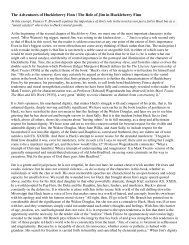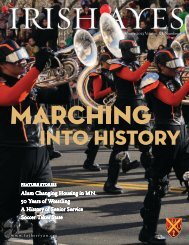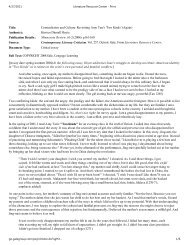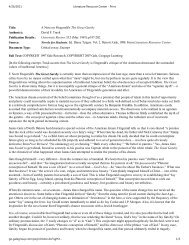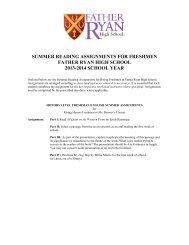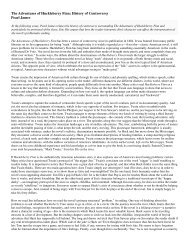Ch 1-15 Packet
Ch 1-15 Packet
Ch 1-15 Packet
Create successful ePaper yourself
Turn your PDF publications into a flip-book with our unique Google optimized e-Paper software.
FOCUS ACTIVITYBefore You ReadThe Adventures of Huckleberry Finn <strong>Ch</strong>apters 1–<strong>15</strong>Freedom means different things to different people. What does it mean to you?List IdeasWith a partner, examine what the concept of freedom means to you. Brainstorm a list of statements thatdescribe the idea of freedom.Setting a PurposeRead to find out what freedom means to a boy and a man living during the 1800s.BACKGROUNDPoint of ViewPoint of view is the relationship of the narrator, or storyteller, to the events of the story. Huckleberry Finn istold by the character Huck, using words like I and we. Therefore, it is told from the first-person point ofview. The reader sees everything through Huck’s eyes and is given his perspective on events.When examining a narrative point of view, it is important to distinguish the narrator from the author.Huck is an uneducated fourteen-year-old boy living in a village in the 1840s. He has the knowledge,beliefs, and experiences of such a boy. Twain, on the other hand, was a well-traveled writer and experiencedlecturer. He was well aware of how to use narrative techniques, adopt different points of view, andspeak in the role of different characters, and he used that knowledge to create a narrator who is very differentfrom himself.Unreliable NarratorHuckleberry Finn is also an example of an unreliable narrator—one who does not understand the full significanceof the events he describes and comments on. Huck is not intentionally unreliable; his lack ofeducation and experience makes him so. Much of the humor in the first chapters comes from Huck’sincomplete understanding of the adults around him and their “sivilized” ways.VOCABULARY PREVIEWdismal [dizməl] adj. gloomy; depressingnotion [nōshən] n. theory; beliefraspy [raspē] adj. harsh; gratingseedy [sēdē] adj. shabby; run-downskiff [skif] n. small boat; flat-bottomed rowboatthrash [thrash] v. to strike; to beatvictuals [vitəlz] n. foodCopyright © by The McGraw-Hill Companies, Inc.12 The Adventures of Huckleberry Finn Study Guide
Name Date Class Active ReadingThe Adventures of Huckleberry Finn <strong>Ch</strong>apters 1–<strong>15</strong>The first chapters of a novel introduce readers to the conflicts, or struggles, that the characters will facethroughout the course of the story. External conflicts are struggles between characters who have differentgoals or between a character and forces of nature. Internal conflicts are psychological struggles that charactersexperience when they are unhappy or face difficult decisions. External conflicts often trigger internal conflicts.As you read the first fifteen chapters of Huckleberry Finn, use the chart below to keep track of the conflictsthat the characters experience. Add boxes on a separate sheet of paper if you need to. Recognizing majorconflicts will help you understand the major themes, or ideas about life, that are developed in the novel.Huckvs.Miss Watson and the WidowExplanation of conflict: the sisters want to “sivilize” Huck; he wants to be freeExplanation of conflict:vs.vs.Copyright © by The McGraw-Hill Companies, Inc.Explanation of conflict:Explanation of conflict:vs.Explanation of conflict:vs.The Adventures of Huckleberry Finn Study Guide 13
Name Date Class RespondingPersonal ResponseWhat is your first impression of Huck? Why?The Adventures of Huckleberry Finn <strong>Ch</strong>apters 1–<strong>15</strong>Analyzing LiteratureRecall and Interpret1. At the beginning of the novel, with whom is Huck living? In what ways do they try tochange Huck? Do you think they succeed? Explain.2. Briefly describe Pap. What is his ultimate goal in harassing Huck?3. How does Huck escape from the cabin in Illinois? What does his ability to escape suggestabout him?4. Where is Huck reunited with Jim? In what significant ways are Jim and Huck alike? Inwhat significant ways are they different?5. Why does Huck put a dead snake on Jim’s blanket? What harm comes to Jim as a resultof the incident? In your opinion, is Huck sorry for the harm he caused? Explain.Copyright © by The McGraw-Hill Companies, Inc.14 The Adventures of Huckleberry Finn Study Guide



